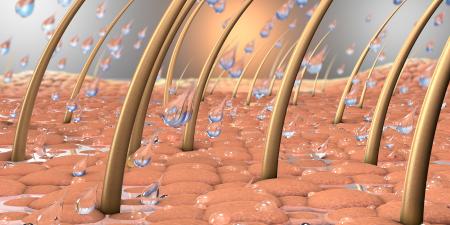Case
Dr. McIntyre, a dermatologist, enters the examining room and greets his patient, Reina, and her parents. Reina is 14 years old and has been a patient of Dr. McIntyre's for about a year. Anxious about beginning her freshman year of high school in a few weeks, Reina expresses frustration over her worsening acne. Dr. McIntyre recognizes that Reina's condition has progressed from a moderate form of acne vulgaris to inflammatory acne, observing the development of nodules and signs of early scarring. At her initial visit to his office, Dr. McIntyre prescribed a topical antibiotic combined with benzoyl peroxide. However, over the last three months he has added oral antibiotics to her treatment regimen.
Reina tells Dr. McIntyre that one of her soccer teammates, Melissa, used to have bad acne too, but it has gotten better since she started taking Accutane (isotretinoin). Reina asks if Dr. McIntyre can put her on that medication. Mr. and Mrs. Sharpe express concern at Reina's request, and ask to speak to Dr. McIntyre in the hallway. Outside the examining room, Raina's mother says that she has read that Accutane can lead to depression and would also require that her daughter begin taking birth control pills. Her parents reiterated the feelings about birth control pills that they shared with Dr. McIntyre when he initially offered it as a stand-alone treatment alternative for acne. They feel that Reina is too young to be on "the pill," and besides, birth control of any kind is not permitted in their faith tradition. Her father adds that money is not an issue, and they would be happy to pay for laser surgery or dermabrasion to improve Reina's scars.
Dr. McIntyre is concerned that the oral and topical antibiotics are not treating Reina's acne effectively and that the preferred next treatment step would be to prescribe isotretinoin. However, that is a difficult therapy regimen, one that requires monthly office visits and strict oral contraceptive use and carries the possibility of side effects. On the other hand, he does not believe that Reina should have to rely on laser surgery to fix scars that could be prevented by isotretinoin treatment.
Commentary
This case is a microcosm for the recent controversy over isotretinoin. From a medical point of view, the drug is certainly the therapy of choice for nodulocystic acne, especially if there is a risk of permanent scarring. The introduction of isotretinoin in 1982 was a major advance in the treatment of severe acne. The drug is highly effective and is not associated with serious adverse events for the vast majority of those who use it.
One of the major concerns in the use of isotretinoin is pregnancy prevention. Prior to the approval of the drug, premarket studies in animals showed high rates of central nervous system defects and facial malformations after gestational exposure [1]. Within months of the introduction of isotretinoin into the market, severe malformations were reported in infants of women taking the drug [2]. Approximately 40 percent of infants exposed to the drug in the first trimester have serious birth defects. In addition, children exposed in utero who do not develop a major malformation may still be affected by cognitive deficits [1].
Early risk management efforts
In 1988, the FDA, in conjunction with the manufacturer of isotretinoin, developed a Pregnancy Prevention Program to increase awareness of the teratogenicity of the drug. This program included written informed consent and a commitment by women taking the drug to use two contraceptive methods simultaneously. Despite this program, reports of fetal exposure continued during the 1990s [1].
The next risk management program was implemented in 2002. This program, in four variants known as SMART, SPIRIT, ALERT, or IMPART, depending on the manufacturer of isotretinoin, had several features: pregnancy tests, two forms of contraception, a qualification sticker on the prescription, survey participation, patient consent forms, a letter of understanding signed by a physician and patient education.
Next, in February 2004, the FDA advisory committee reported that compliance with these elements of the risk management program had not been universal [3]. In fact, Roche, one of the manufacturers of the drug, reported an increased number of cases of pregnancy among isotretinoin users after SMART was introduced. In all, Roche received 150 reports of pregnancy cases prior to SMART implementation and 183 afterward. Although there was a slight decrease in the number of women who were already pregnant before starting isotretinoin, no improvement was reported in baseline pregnancy testing, monthly pregnancy testing or birth control methods [4].
The iPLEDGE Program
The latest program was introduced in March 2006. It is called iPLEDGE and is quite complex. Utilizing an Internet-based system, iPLEDGE requires the registration of all wholesalers who distribute isotretinoin, all health care professionals who prescribe isotretinoin, all pharmacies that dispense isotretinoin and all patients, men and women, who take the medicine.
The program is rigorous for both the patient and physician. Female patients cannot obtain or fill their first prescription unless they meet the following requirements: initial screening, two negative blood or urine pregnancy tests with documented results verified by the prescriber and registration in the password-protected system. Female patients with child-bearing potential also must commit to using two forms of contraception during the course of therapy and for one month before and after taking the drug. The patient is required to have a negative pregnancy test result every month throughout this period, and to report the test results as well as verification of the two methods of contraception being used. This information must be entered by the prescriber into the iPLEDGE system.
The advantages of the new program include the following: the unification of four risk management programs into one; the potential to drastically reduce or eliminate pregnancies among women taking isotretinoin; increased survey participation; a change in behavior of physicians, pharmacists and patients who have not complied with previous rules; assurance that only qualified physicians will prescribe; and, most importantly, assurance that this drug will remain on the market for patients with severe acne who need it.
There are also several potential disadvantages. No program is likely to reduce pregnancies to zero; some pregnancies will always occur. The iPLEDGE program requires physicians to shoulder a big administrative burden, and the risk remains that an underground trade in the drug via Internet and foreign sales could grow as patients become frustrated with a more restrictive system. Many physicians may decide not to prescribe the medicine if this safety process becomes more cumbersome. The worst consequence would be that patients who need isotretinoin would not be able to obtain it.
iPLEDGE and the Minor Patient
The case described above is a difficult one for the dermatologist. Of course, in the case of a minor, the parents have the final say. But it is incumbent upon the dermatologist to educate the parents as much as possible, especially in light of all of the negative stories about isotretinoin that are being disseminated by the press. The link between isotretinoin and depression, for example, has never been firmly established. Chia et al. performed a recently published study to determine whether patients with moderate to severe acne who were treated with isotretinoin experienced significant increases in depressive symptoms over a three-month to four-month period compared with patients who received "conservative" acne therapy [5]. A total of 132 subjects, aged 12 to 19 years, with moderate to severe acne were enrolled. Depressive symptoms were assessed using the Center for Epidemiological Studies Depression Scale (CES-D), a standardized self-reported instrument.
A total of 101 subjects completed the study. At follow-up, CES-D scores (adjusted for baseline CES-D score and sex of patient) suggestive of clinically significant depression were no more prevalent in the isotretinoin group than in the conservative therapy group. In addition, the incidence of new onset of depressive symptoms was not significantly different between the treatment groups. The authors concluded that the use of isotretinoin in the treatment of moderate to severe acne in adolescents did not increase symptoms of depression. Interestingly, treatment of acne either with conservative therapy or with isotretinoin was associated with a decrease in depressive symptoms [5].
In our case, Dr. McIntyre should review the truths and fictions regarding isotretinoin with the family, and reemphasize the potential physical and psychologic sequelae of her condition. He should also point out that abstinence is one of the acceptable forms of pregnancy prevention, in the case of lifestyle choice such as religious practice. If the parents do not agree, he should at least try to leave the matter open for further discussion if Reina's acne does not improve.
Despite all of the difficulty inherent in the use of isotretinoin, I urge clinicians to stay committed to the treatment of acne and to make the extra effort to provide isotretinoin to those who need it.
References
- Koren G, Avner M, Shear N. Generic isotretinoin: a new risk for unborn children. CMAJ. 2004;170(10):1567-1568.
- Lammer EJ, Chen DT, Hoar RM, et al. Retinoic acid embryopathy. N Engl J Med. 1985;313(14):837-841.
-
American Society of Health-System Pharmacists. Isotretinoin Risk-Management Program to Be Revamped. Available at: http://www.ashp.org/news/ShowArticle.cfm?id=8774. Accessed June 25, 2006.
-
FDA Advisory Committee. Accutane Pregnancy Exposure May Have Increased Under Risk Management Plan, FDA Says. Available at: http://www.fdaadvisorycommittee.comFDC/AdvisoryCommittee/Committees/Dermatologic+and+Ophthalmic+Drugs/022604_AccutaneDay1/0226-2704_accutaneP2.htm. Accessed June 27, 2006.
- Chia CY, Lane W, Chibnall J, Allen A, Siegfried E. Isotretinoin therapy and mood changes in adolescents with moderate to severe acne: a cohort study. Arch Dermatol. 2005;141(5):557-560.



